To win it all in 1985, Villanova had to do what it couldn't all season
Following our recent series on the best teams never to win a championship, we're flipping the concept. This series will examine a selection of the most unlikely teams to reach the mountaintop. These teams can be ones that got hot at the right time, or those who belong to franchises that have not often tasted the Champagne of champions. Previous entries covered MLB, NHL, NFL in 2001 and 2002, NBA in the 1970s and 2010s, and college football.
A great NCAA Tournament run can be sparked by early March momentum. Before winning the national championship in 1983, North Carolina State picked off Michael Jordan's North Carolina squad, and Ralph Sampson's Virginia team to win the ACC Tournament.
It can also be a matter of circumstance. When Shabazz Napier and UConn won the 2014 national championship as a No. 7 seed, its final foe was a talented-but-young Kentucky team that was seeded eighth.
Neither factor applied to the 1984-85 Villanova men's basketball team. The Wildcats entered the tournament unranked, off a loss, and snakebitten by two of the favorites to win it all. To win the national championship, the Wildcats had to go through some of the best programs of their time.
It's what makes Villanova's first national championship so special - and improbable - even 35 years later.
The setup
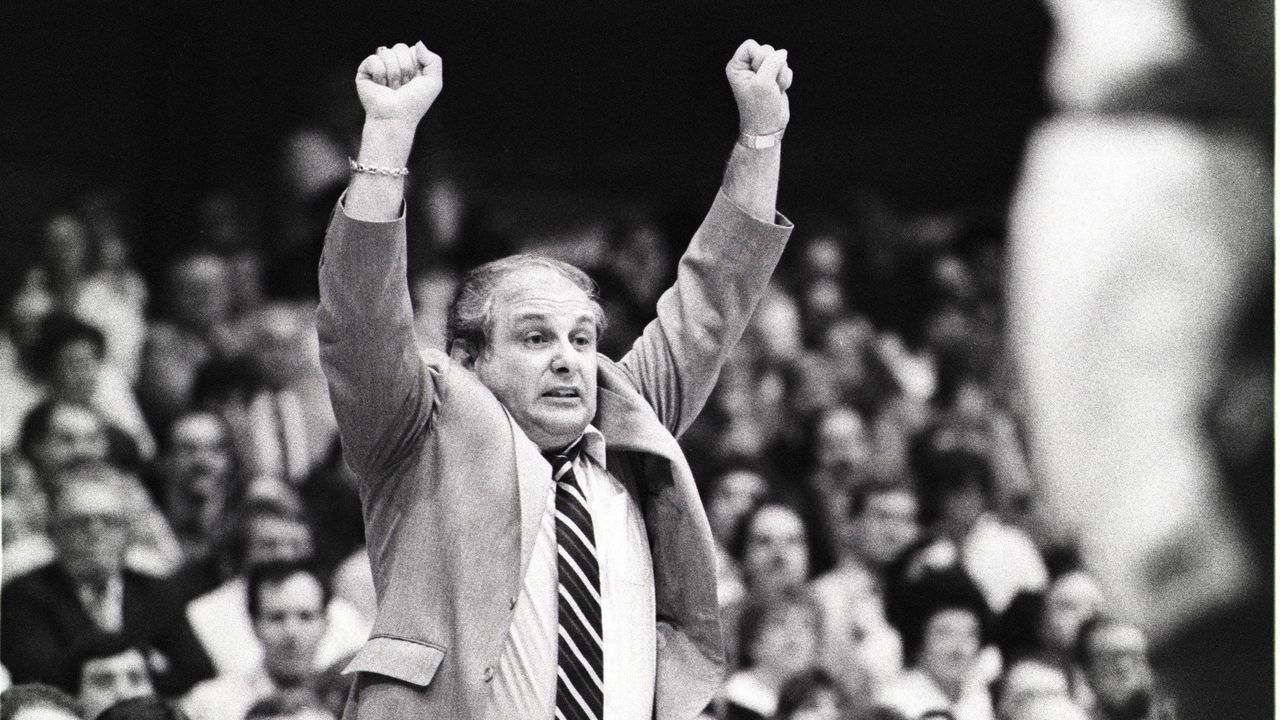
When Rollie Massimino took over the Villanova program in 1973, it was coming off its first losing season in more than a decade. The program reached the national championship game in 1971, losing a close one to UCLA, but the wins from that season were vacated when it became known that star player Howard Porter received money to play professionally before the end of the season.
It took the energetic Massimino a couple of seasons, but Villanova started to turn the corner by his third year, when it won 16 games. In 1976, the Wildcats shed their independent status and joined the Eastern Collegiate Basketball League - an eight-team conference that included Duquesne, George Washington, Massachusetts, Penn State, Pittsburgh, Rutgers, and West Virginia.
Four years (and two NCAA Tournament appearances) later, Villanova upgraded by joining the Big East Conference, then in its second year.
These were the halcyon days for the Big East, with John Thompson II at Georgetown, Jim Boeheim at Syracuse, and Lou Carnesecca at St. John's. Villanova quickly rose to the challenge. The Wildcats rose to No. 4 in the country in 1983 - at the time, the highest ranking in school history - and reached back-to-back regional finals in 1982 and 1983, losing to Jordan's UNC one year and Houston's "Phi Slama Jama" lineup the next.
But until March, the 1984-85 season was a slightly different story. Villanova was still good, a veteran-laden team led by three future NBA draft picks. Six-foot-9 senior Ed Pinckney led the team in scoring (15.9 points per game) and rebounding (8.9 per game). Guard Dwayne McClain and forward Harold Pressley also scored in double figures. Senior point guard Gary McLain was a rock. But the Wildcats appeared to be a tier below the top of the Big East - and the top of college basketball.
Villanova finished the regular season 19-10, but 9-7 within the conference. The Wildcats were a combined 0-5 against Georgetown and St. John's. Four of the losses were close, but they were still losses.
Villanova vs. ranked opponents, '84-85 regular season
| Date | Opponent | Result | Score |
|---|---|---|---|
| Jan. 2 | No. 5 Syracuse | W | 82-70 |
| Jan. 7 | at No. 4 St. John's | L | 76-71 |
| Jan. 12 | No. 1 Georgetown | L | 52-50 |
| Jan. 15 | No. 15 Boston College | W | 85-66 |
| Feb. 1 | at No. 9 Syracuse | L | 92-79 |
| Feb. 9 | No. 1 St. John's | L | 70-68 |
| Feb. 11 | at No. 2 Georgetown | L | 57-50 |
| March 8 | at No. 2 St. John's | L | 89-74 |
From Jan. 27 to March 8, Villanova went 6-7, culminating in an 89-74 loss to St. John's in the quarterfinals of the conference tournament.
But the NCAA Tournament expanded from 53 to 64 teams before the 1985 season, ensuring there would be room for the Wildcats despite their up-and-down finish. On Selection Sunday, Villanova was placed in the Southeast region as the No. 8 seed - earning a trip to Dayton, Ohio, to face the hometown Flyers and possibly top-seeded Michigan.
The tournament
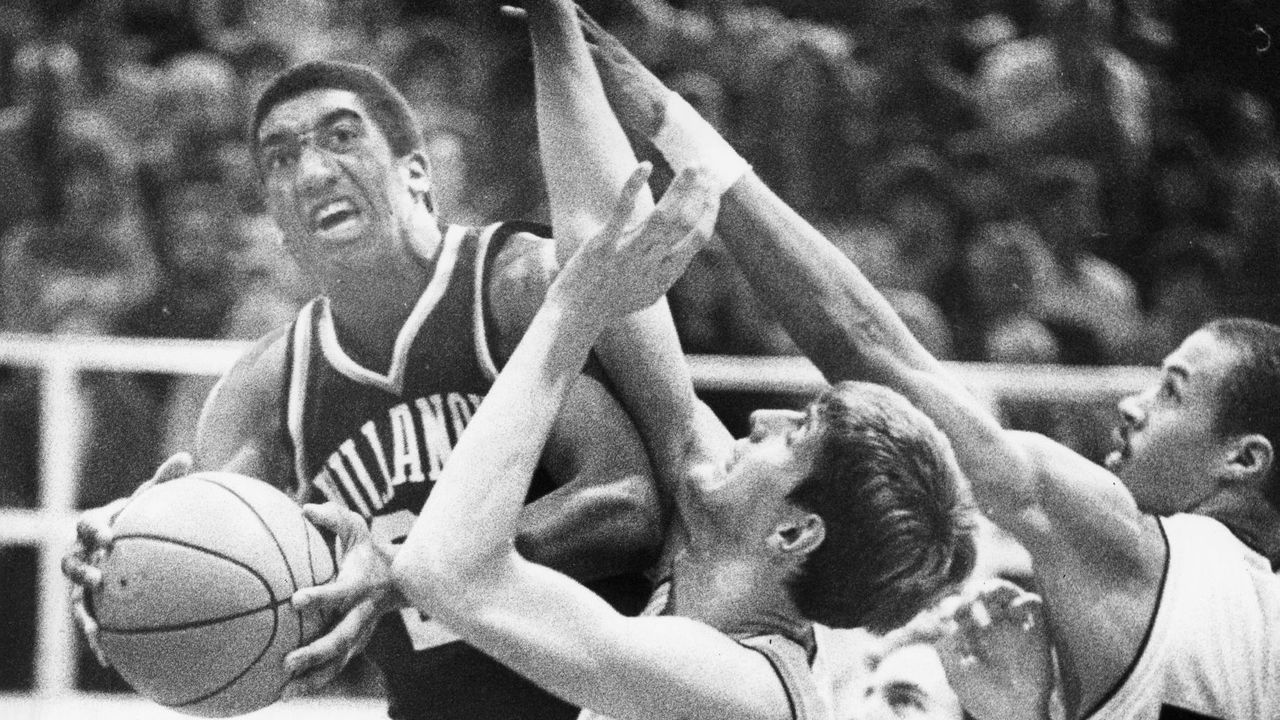
The shot clock wasn't introduced to college basketball until the 1985-86 season. Villanova used the lack of one to its benefit for much of the NCAA Tournament.
That started against 9-seed Dayton. A tight game was tied at 49 when Villanova took possession with 2:30 to play. The Wildcats spread it out, moving to their four corners offense - killing clock while waiting for an opening to appear.
Villanova drained more than half the remaining time in the game before Harold Jensen's layup with 70 seconds left gave it a 51-49 lead.
Dayton, in turn, held the ball until the final 10 seconds, but missed a shot to send the game to overtime.
The second round brought Michigan, which won the Big Ten regular season and entered the game 26-3 overall. This was pre-Fab Five Michigan, but the roster was full of talent. Future lottery pick Roy Tarpley, at 6-foot-11, averaged a double-double. Gary Grant, a 6-foot-3 freshman guard, would also go on to be a first-round pick. Villanova was unranked and Michigan was 23-1 against unranked opponents.
Here, though, Villanova's strong Big East schedule played in its favor. The Wildcats had nothing to fear, having played those five games against Georgetown and St. John's, who were No. 1 seeds in other parts of the bracket.
"It helps playing against Patrick Ewing twice a year," Pinckney told the Chicago Tribune after the game. "That's enough to set you up to go against the best."
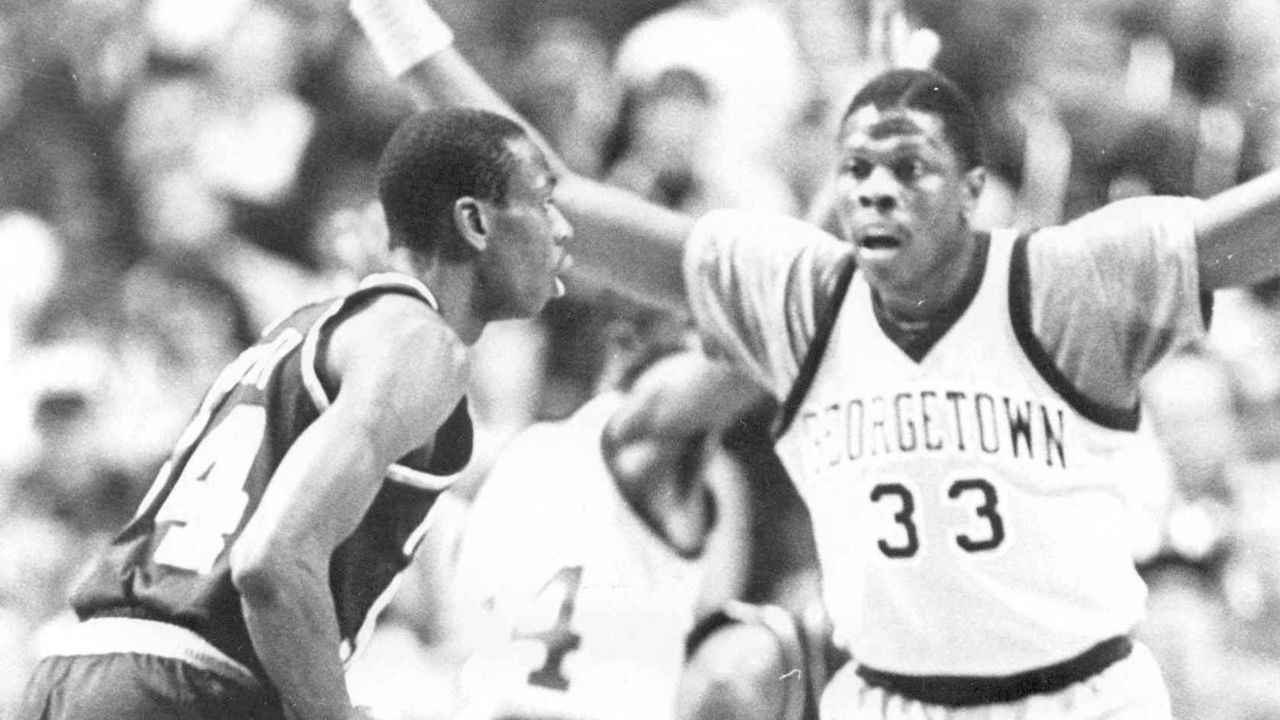
Pinkney and McClain, two seniors, scored 35 of Villanova's points in a 59-55 win that left no doubt about the Big East's depth. For the second consecutive game, Massimino's team did all it could to shorten the game.
"Thank God the shot clock was off," Massimino told the Tribune. "These kids have been through this sort of thing before."
It marked Villanova's third Sweet 16 appearance in four years. In the other two runs, the Wildcats were a 3-seed. This time, Villanova maintained the role of underdog as it traveled to Birmingham, Alabama, to play fifth-seeded Maryland and, ultimately, second-seeded North Carolina.
Against Maryland, the Wildcats employed more of the same strategy. The Terrapins averaged more than 70 points per game on the season, led by one of that season's best combos, Len Bias and Adrian Branch. In the regular season, Maryland defeated Villanova 77-74.
Villanova held them to 43 in the rematch. Branch scored nearly half of those, but Bias was limited to eight points on 4-of-13 shooting. Pinckney, who led the Wildcats with 16 points and 13 rebounds, again got the better of an opposing forward. The Wildcats led by as many as 10 in the second half and won by three.
Writers projected Villanova could have trouble in the regional final contending with North Carolina's tall trio of Brad Daugherty (6-foot-11), Joe Wolf (6-foot-10), and Dave Popson (6-foot-10). For one half, they were right: The Tar Heels took a 22-17 lead in the opening 20 minutes. Then, The New York Times reported, Massimino delivered a fiery halftime speech to spur his team to his first Final Four.
Massimino said after the game: "I never did before what I did at halftime today. We let each player know where we'd come from and how we got here."
Here's how Pressley put it, also according to the Times: "He yelled at us. He told us we were throwing it all away, that we weren't doing the things that had gotten us to this point. He couldn't believe what was happening."
The second half was a different story. Villanova surged to a 56-44 win, scoring 39 after the speech. Jensen, the guard who scored the go-ahead bucket against Dayton, scored 10 points in 31 minutes off the bench, two days after going scoreless in 11 minutes against Maryland. Pinckney, the region's most valuable player, managed seven rebounds against UNC's trees.
Villanova's plans - get ahead, slow the pace, outscore teams at the free-throw line, frustrate them with a zone-style defense - turned out to be the perfect formula to propel a squad of overachievers to the precipice.
The Final Four
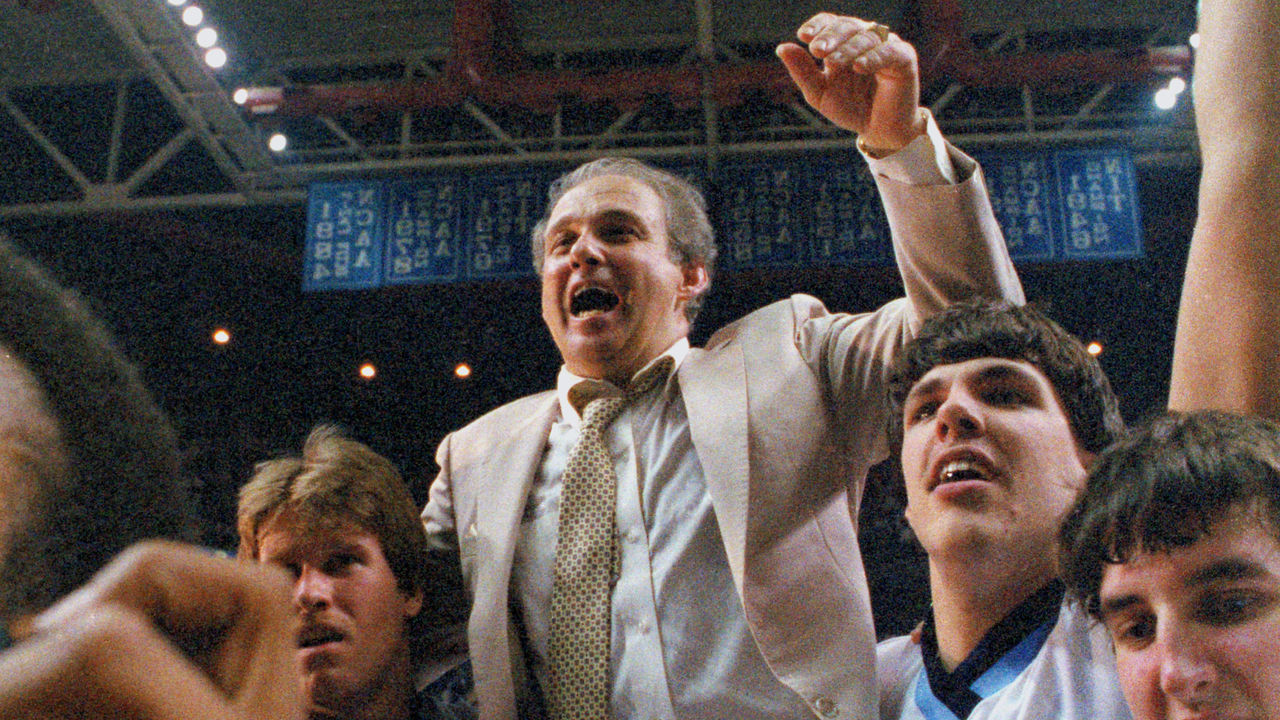
With Georgetown and St. John's also advancing - scheduled to meet in one semifinal matchup - the Big East became the first conference ever to put three teams in the Final Four. It also meant that for Villanova to win, it had to do what it couldn't in the regular season.
The lowest-seeded team in history to reach the Final Four, Villanova had momentum by the time it reached Lexington, Kentucky, and Rupp Arena. It had held four straight quality opponents below 60 points. It had three senior starters - Pinckney, McClain, and McLain - playing at a high level.
Memphis State, the opponent, was 31-3 and ranked in the top 10 all season. But it was nothing Villanova hadn't seen. The Wildcats' zone defense was locked in, limiting Memphis to 38% shooting and a season low in scoring in a 52-45 win. Villanova's three senior starters combined to score 40 of the 52 points.
The Wildcats were an 8-seed in the championship game - where they met overwhelming favorite, defending national champion, and Big East nemesis Georgetown.
Georgetown won the regular-season meetings narrowly, 52-50 and 57-50, but was still heavily favored. Ewing, soon to be the No. 1 pick in the NBA draft, aimed to end his college career with a second championship.
"We'll do what we think we have to do to win the game, but that still might not be enough," Massimino told The New York Times before the game.
Villanova needed to play a near-perfect game, and it did. The Wildcats didn't let the game get out of hand early, which would have allowed the Hoyas to dictate the pace. They made 22-of-27 free throws while limiting Georgetown to eight attempts.
Whatever Georgetown tried to do defensively, Villanova couldn't miss. It shot 78.6% - 22-of-28 - from the field, with the trio of Pinckney, McClain, and McLain combining to score 41 points on 13-of-17 shooting. Pinckney, the star of the tournament, outscored and outrebounded Ewing, who ended his Hoyas career with 14 points and five boards. (While Ewing would go first, Pinckney went 10th in the 1985 draft and played for seven teams over 12 seasons.)
Even a historically great shooting performance wasn't enough to dethrone a historically great Hoyas squad. Georgetown took a 54-53 lead with 4:50 to play on a David Wingate jump shot. But Villanova moved ahead again - courtesy of Jensen, the sixth man - and, with a 59-54 lead in the final 90 seconds, used the four corners offense to frustrate the Hoyas while scrambling to hang on.
After Pressley's free throw put Villanova ahead 66-62 with 10 seconds left, Georgetown cut it to two with two seconds remaining. Villanova called a timeout.
As Massimino paced the sideline, the final inbounds pass was arguably the defining snapshot of the run: McClain catching Jensen's inbounds pass as he falls to the ground and raising an arm to the sky as the final milliseconds tick away.
"Villanova put on a display of offensive execution, defensive perseverance and mental fortitude in the second half that will be long remembered and cherished," Roy S. Johnson wrote in the next day's New York Times.
The legacy
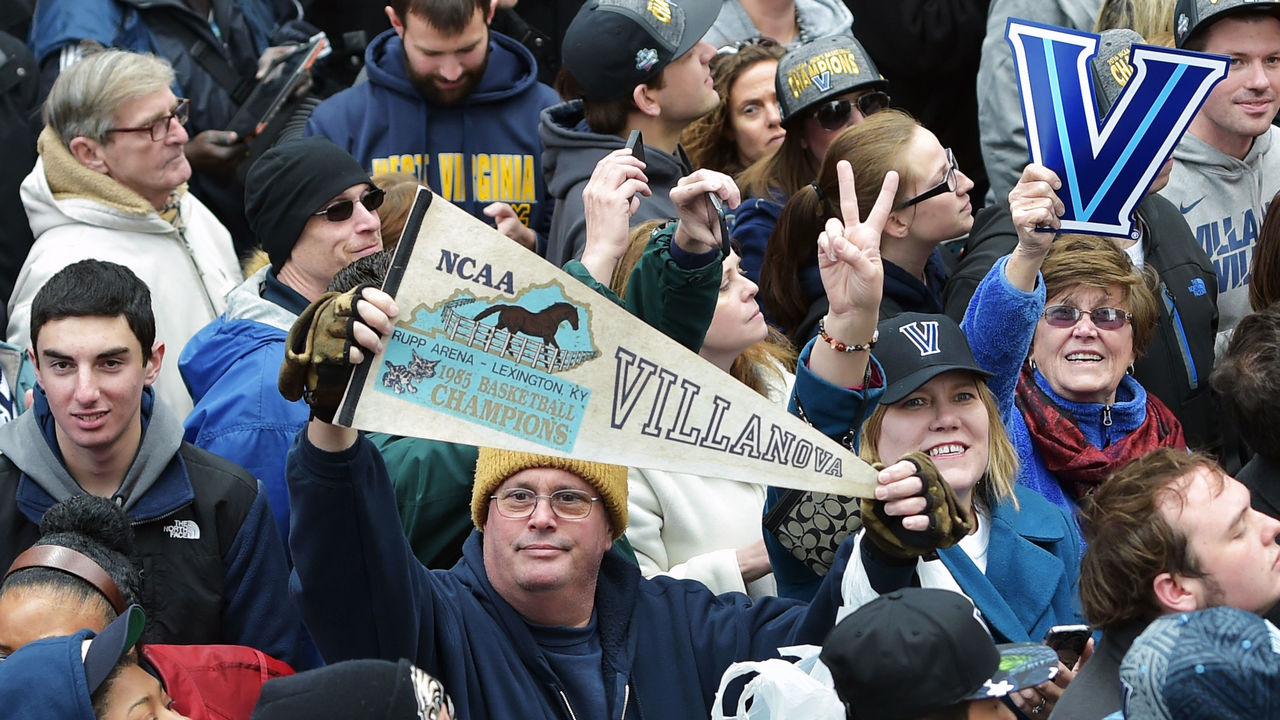
In the 35 years since Villanova raised the trophy, a number of Cinderellas have made runs to the Final Four. Most of their runs stop there.
Villanova remains the lowest seed to win a national championship. Of the 12 teams seeded eighth or worse to make a Final Four since 1985, only two - Butler in 2011 and Kentucky in 2014 - advanced to the title game. The NCAA Tournament is famous for its upsets and parity, but the cream usually rises to the top at the Final Four; the last 22 championships have been won by teams seeded Nos. 1, 2, or 3.
What makes Villanova's run more impressive: The Wildcats didn't have it easy. They played four of the top seven teams in the country - No. 2 Michigan, No. 7 North Carolina, No. 5 Memphis State, and No. 1 Georgetown - en route to the title.
On paper, the Wildcats were no one's choice. It never stopped them.
Mark Cooper is theScore's NCAA writer.